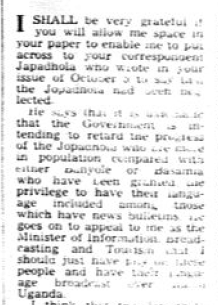
W/ the passing of Nnamasole Margaret Nagawa Siwoza Muyanja, I express my deepest condolences to @BugandaOfficial. Kitalo nnyo! The Nnamasole was the heir of Nnamasole Sarah Nalule Kisosonkole, the mother of Kabaka Mutebi. 1/
One of the Kabaka's first appearances was at the funeral of his father, during which he was accompanied by the Nnamasole: bit.ly/3ddWAFQ 2/
Much earlier, the army of the Nnamasole had played a key role in the political developments of the 1890s, as the servants of the Nnamasole had for centuries. In his history of Kabaka Mwanga, Apolo Kaggwa recounted that on 'the 20th October Kabaka Chwa sent 3/
out Apolo Kagwa Katikkiro to wage war on the Nubians. Upon departure from the capital, I spent the following night in the Kisalosalo and sent out Yakobo Kago and Bunjo the Katikkiro of the Namasole to advance ahead of the army.' Kagwa's land policies sought to undermine 4/
the authority of Buganda's royal women. Be that as it may, musicians & Baganda historians continued to wrestle with the power of the Namasole in the early twentieth century. This ambiguity was expressed in the following proverb, 'Abakulu n'abakulu tibaleekaana: 5/
singa Nnamasole ayitiriza Mulere; ekigerere we kifulumu kiwakanya kinnaakup.' 6/
• • •
Missing some Tweet in this thread? You can try to
force a refresh

















